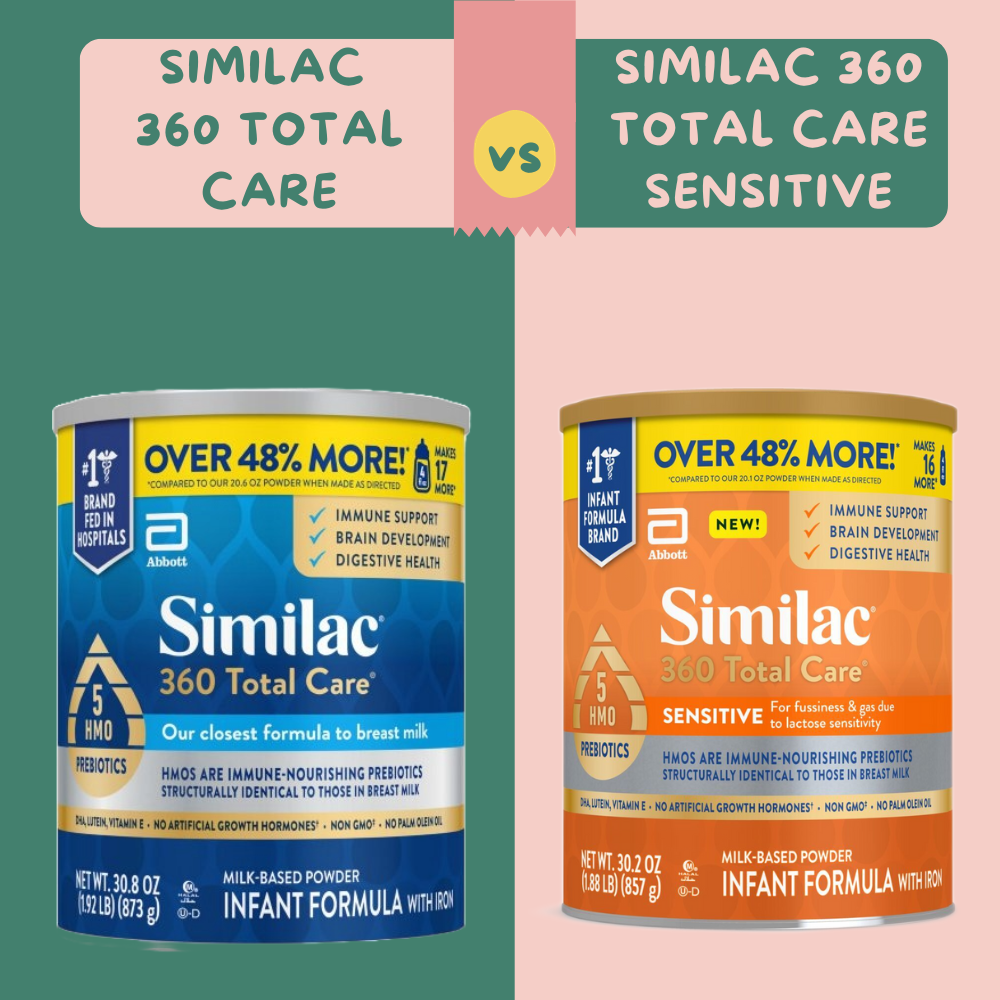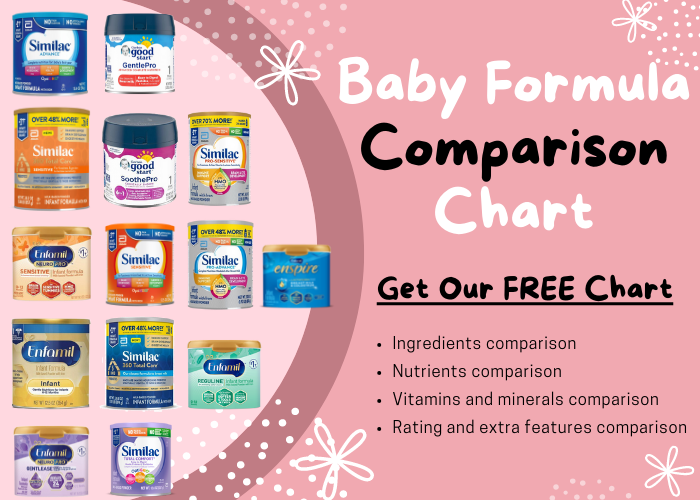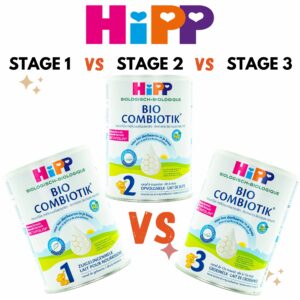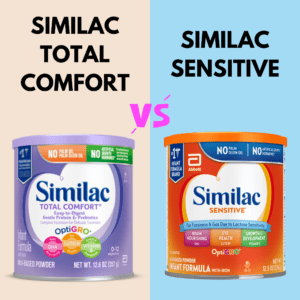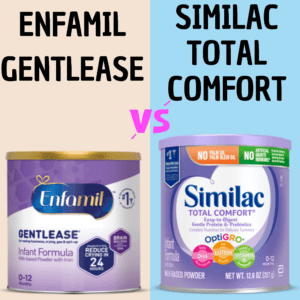What is The Difference Between Them?
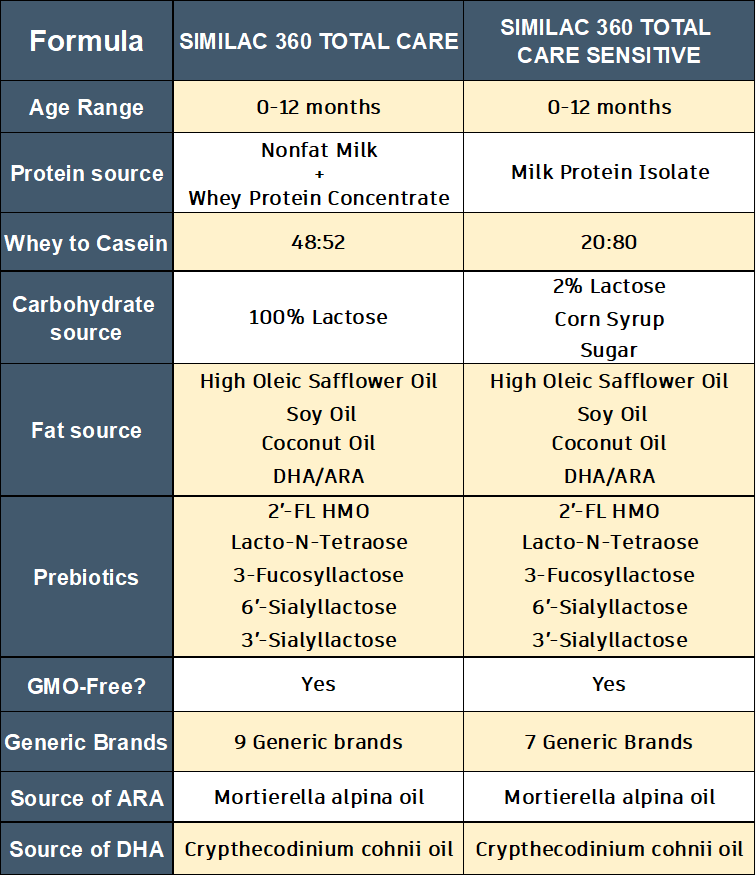
Similac 360 Total Care is a standard formula designed for healthy, full-term infants, providing a well-rounded nutrition profile while Similac 360 Total Care Sensitive is a lactose-reduced (by 98%) formula for infants with sensitive tummies, featuring gentle ingredients to minimize digestive discomfort. The primary distinction lies in their suitability for different baby needs.
The Best One?
The choice between Similac 360 Total Care and Similac 360 Total Care Sensitive is not a matter of one being definitively better than the other. The “best” formula for your baby depends on their individual needs, dietary requirements, and any specific sensitivities they may have.
Similac 360 Total Care is designed for healthy, full-term infants, offering a balanced nutritional profile. On the other hand, Similac 360 Total Care Sensitive is formulated for babies with sensitive tummies, providing gentler ingredients to reduce digestive discomfort due to lactose sensitivity.
Mom’s Reviews Comparison:
When considering the experiences of mothers who have used Similac 360 Total Care and Similac 360 Total Care Sensitive, a deeper understanding of these infant formulas’ merits and drawbacks becomes evident.
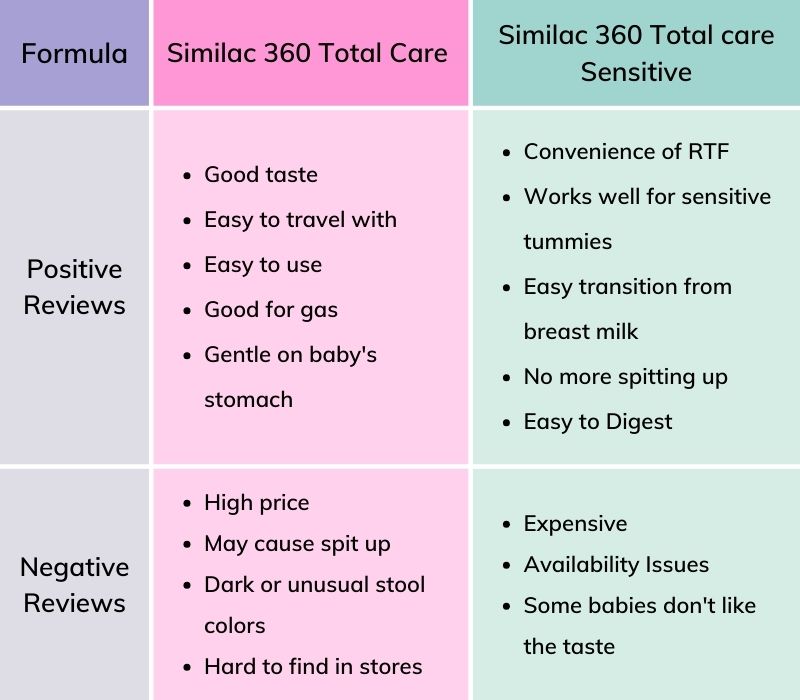
Similac 360 Total Care:
Positive Reviews:
Many mothers find that their babies enjoy the taste of Similac 360 Total Care, which can be a crucial factor in ensuring that babies consume sufficient nutrients.
Its travel-friendly ready-to-feed bottles (2-fl-oz and 8-fl-oz), ease of preparation, and ability to reduce gas are widely appreciated. The formula is also lauded for being gentle on babies’ sensitive stomachs.
Negative Reviews:
However, some mothers do express reservations about its price point, considering it to be on the higher end of the spectrum. Additionally, there are reports of occasional spitting up, which can cause concern.
A notable point of criticism is the observation of dark or unusual stool colors, which may lead to undue anxiety for new parents. Availability in physical stores is also cited as an issue in some regions.
Related: Similac Advance vs 360 Total Care
Similac 360 Total Care Sensitive:
Positive Reviews:
Similac 360 Total Care Sensitive shines in terms of convenience due to its ready-to-feed (RTF) formulation, which simplifies feedings for busy parents.
The formula’s primary selling point is its ability to cater to infants with sensitive tummies, often resulting in reduced instances of spitting up and digestive discomfort. For mothers transitioning from breastfeeding to formula, this variant is regarded as an easy and effective choice.
Negative Reviews:
Just like the regular 360 Total Care formula, the Sensitive version is criticized for its relatively high cost. Availability issues can be more pronounced for the sensitive variant, which can be frustrating when parents need to restock. A minor drawback mentioned by a few mothers is that some babies might not find the taste as appealing.
Ingredients Comparison:
Age Range:
Both Similac 360 Total Care and Similac 360 Total Care Sensitive are suitable for infants from 0 to 12 months, making them versatile options for early childhood nutrition.
Protein Source:
Similac 360 Total Care is crafted with a protein blend that comprises nonfat milk and whey protein concentrate, providing an optimal whey-to-casein ratio of 48:52. This well-balanced protein source contributes to overall growth and development while being gentle on a baby’s stomach.
Similac 360 Total Care Sensitive, designed for infants with sensitivities, utilizes a combination of milk protein isolate and whey protein concentrate. This results in a protein profile with a higher casein content and a whey-to-casein ratio of 20:80, which can be more suitable for babies with delicate stomachs.
Related: Similac Sensitive Vs. 360 Total Care Sensitive
Carbohydrate Source:
Similac 360 Total Care relies solely on 100% lactose as its carbohydrate source. Lactose is the primary carbohydrate found in breast milk, making this formula an excellent choice for babies who are not lactose intolerant.
Similac 360 Total Care Sensitive, tailored to infants with sensitivities, contains a minimal amount of lactose (2%), supplemented by corn syrup and sugar. These additional carbohydrates are included to make digestion easier for babies who may experience discomfort with high lactose levels.
Fat Source:
Both Similac 360 Total Care and Similac 360 Total Care Sensitive incorporate a balanced fat blend sourced from high oleic safflower oil, soy oil, and coconut oil. This combination of fats ensures that infants receive the essential fatty acids required for brain and visual development.
DHA/ARA:
Both formulas are fortified with DHA (Docosahexaenoic Acid) and ARA (Arachidonic Acid), which are essential for the development of the nervous system and visual function. This enrichment underscores the commitment to providing comprehensive infant nutrition.
Prebiotics:
Prebiotics are crucial for supporting a healthy gut microbiome in infants. Both Similac 360 Total Care and Similac 360 Total Care Sensitive contain a range of prebiotics, including 2′-FL HMO, Lacto-N-Tetraose, 3-Fucosyllactose, 6′-Sialyllactose, and 3′-Sialyllactose, further promoting digestive health.
GMO-Free:
In alignment with the growing preference for non-GMO products, both Similac 360 Total Care and Similac 360 Total Care Sensitive proudly declare their status as GMO-free, assuring parents of their commitment to using non-genetically modified ingredients.
Generic Brands:
Recognizing the significance of choice and cost considerations, Similac 360 Total Care offers 9 generic brand alternatives, while Similac 360 Total Care Sensitive provides 7 generic brand options. These generic brands can be more budget-friendly, allowing parents to maintain quality while managing expenses.
Source of ARA and DHA:
ARA is sourced from Mortierella alpina oil, and DHA is derived from Crypthecodinium cohnii oil in both formulas. These sources are recognized for their rich content of these essential fatty acids, ensuring their inclusion in infant nutrition.
« HMOs are special prebiotics found naturally in a mother’s breast milk. They are the most abundant solid ingredient in breast milk after fat and carbohydrates. In breastfed babies, HMOs are scientifically shown to positively affect the microbiome. » says nutritionnews.Abbott
Related: Enfamil Infant Vs Similac 360 Total Care: Which One is The Best?
Nutrients Comparison:
Comparing the macronutrients and vitamins of Similac 360 Total Care and Similac 360 Total Care Sensitive on a per 100 calorie basis for infants aged 0-12 months reveals some subtle differences, but overall, both formulas provide essential nutrients necessary for healthy growth and development:
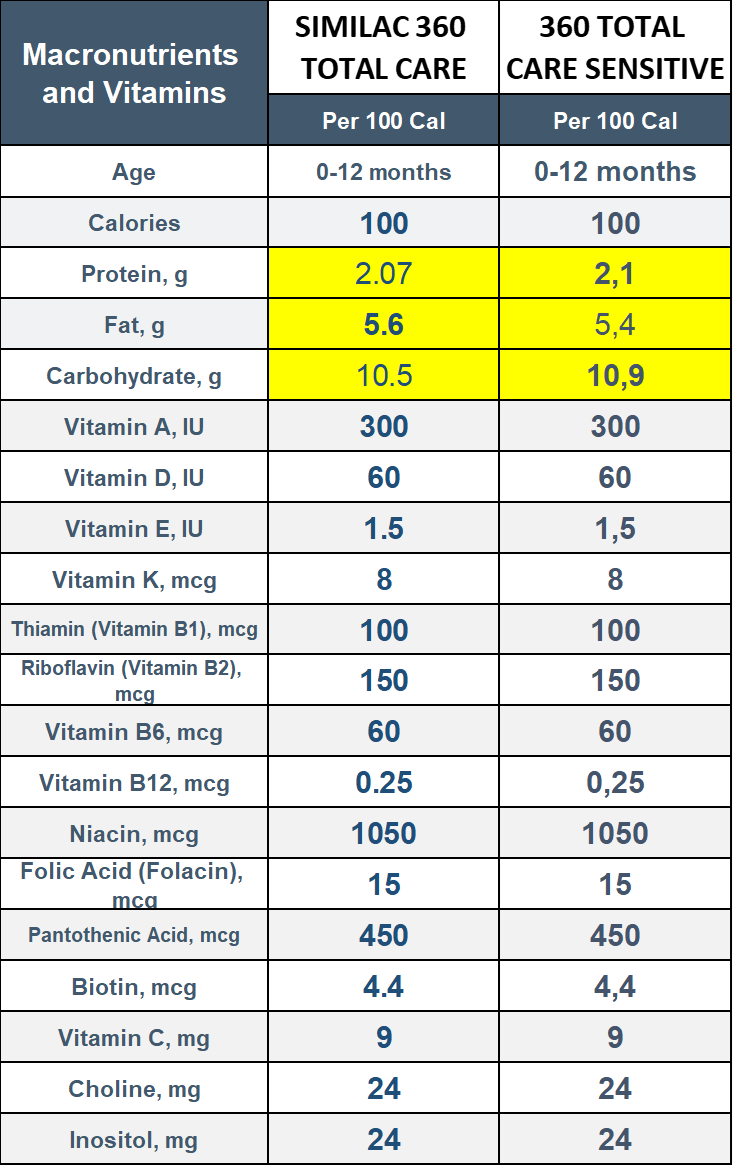
Macronutrients:
Protein (g): Similac 360 Total Care contains 2.07 grams of protein per 100 calories, slightly less than Similac 360 Total Care Sensitive which contains 2.1 grams of protein per 100 calories. This indicates that both formulas are rich in protein, which is crucial for building and repairing tissues, and there’s a negligible difference in protein content between the two.
Fat (g): 360 Total Care contains slightly more fat level (5.6 g) than 360 Total Care Sensitive (5.4 g). However, the fat content in both formulas ensures an adequate source of energy for your baby’s development.
Carbohydrate (g): Similac 360 Total Care Sensitive has a slightly higher carbohydrate content (10.9 g) compared to the regular Total Care formula (10.5 g). This is likely due to the added corn syrup and sugar, making it more suitable for sensitive tummies.
Vitamins:
Both Similac 360 Total Care and Similac 360 Total Care Sensitive provide identical levels of essential vitamins per 100 calories, ensuring that your baby’s daily vitamin requirements are met. These vitamins include Vitamin A, Vitamin D, Vitamin E, Vitamin K, Thiamin (Vitamin B1), Riboflavin (Vitamin B2), Vitamin B6, Vitamin B12, Niacin, Folic Acid, Pantothenic Acid, Biotin, Vitamin C, Choline, and Inositol.
Minerals:
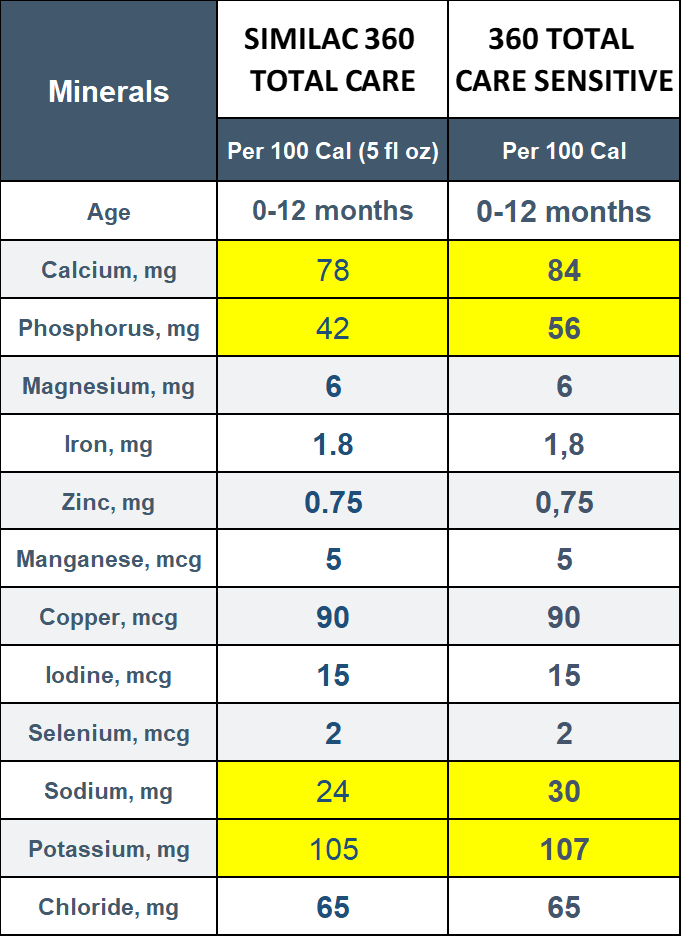
Examining the mineral content of Similac 360 Total Care and Similac 360 Total Care Sensitive per 100 calories (5 fl oz) for infants aged 0-12 months, we can see that these formulas offer similar levels of essential minerals to support your baby’s growth and development except for some minerals:
- Calcium (mg):
- Similac 360 Total Care provides 78 mg of calcium per 100 calories while 360 Total Care Sensitive offers a slightly higher amount of calcium, with 84 mg per 100 calories. This increase is beneficial for building strong bones and teeth in sensitive infants.
- Phosphorus (mg):
- Similac 360 Total Care contains 42 mg of phosphorus per 100 calories whereas 360 Total Care Sensitive includes a higher level of phosphorus, at 56 mg per 100 calories. Phosphorus is essential for bone health and development.
- Sodium (mg):
- Similac 360 Total Care contains 24 mg of sodium per 100 calories while 360 Total Care Sensitive includes slightly more sodium, with 30 mg per 100 calories. Sodium is a critical electrolyte that plays a pivotal role in maintaining proper fluid balance in the body.
- Potassium (mg):
- Similac 360 Total Care contains 105 mg of potassium per 100 calories. In contrast, Similac 360 Total Care Sensitive provides 107 mg of potassium per 100 calories. Potassium is another essential electrolyte responsible for maintaining healthy heart function, muscle contractions, and nerve signaling.
Price and Size Comparison:
In terms of price, both formulas are expensive compared to other formulas, but if we compare the prices between these two, we find that 360 Total Care is slightly cheaper than 360 Tota Care Sensitive. Additionally, both formulas are available in ready-to-feed options for added convenience.
Regarding user rating, they have the same customer rating of 4.8 out of 5.0, indicating high customer satisfaction.
| Similac 360 Total Care | Similac 360 Total Care Sensitive |
|---|---|
| 20.6 oz 35.18 $ 1.70 /oz Buy 20.6 oz 30.8 oz 47.98$ 1.55 /oz Buy 30.8 oz 2-fl-oz $1.25 62.41 ¢/fl oz Buy 2-fl-oz 8-fl-oz $2.78 34.75 ¢/fl oz Buy 8-fl-oz 32-fl-oz 10.92$ 34.12 ¢/fl oz Buy 32-fl-oz | 20.1 oz $35.18 1.75 /oz Buy 20.1 oz 30.2 oz $47.98 1.59 /oz Buy 30.2 oz 2-fl-oz $1.25 62.41 ¢/fl oz Buy 2 fl oz 8-fl-oz $2.70 33.78 ¢/fl oz Buy 8 fl oz 32-fl-oz $10.92 34.12 ¢/fl oz Buy 32 fl oz |
| 4.8 of 5.0 1234 reviews | 4.8 of 5.0 604 reviews |
Can You Mix Similac 360 Total Care and 360 Total Care Sensitive?
It’s generally not recommended to mix 360 Total Care and 360 Total Care Sensitive for a long time, as they are specifically formulated to provide certain nutritional profiles, and combining them can alter this balance. However, you can mix them temporarily in case you want to switch between them.
If your baby requires a formula that is gentler on their stomach, it’s best to choose one that suits their needs. Switching between Similac 360 Total Care and 360 Total Care Sensitive can be done gradually and under the guidance of a pediatrician if necessary, but it’s advisable to stick with one formula at a time to ensure consistency and proper nutrition for your baby.
Can You Switch Between Similac 360 Total Care and 360 Total Care Sensitive?
Yes, you can switch between Similac 360 Total Care and Similac 360 Total Care Sensitive. The key is to do so gradually and ensure that the transition is made in a way that is gentle on your baby’s digestive system.
How to Switch From Similac 360 Total Care to 360 Total Care Sensitive?
Switching from Similac 360 Total Care to Similac 360 Total Care Sensitive should be done gradually to help your baby’s digestive system adjust. Here’s a general guideline on how to make the transition:
- Consult Your Pediatrician: Before making any changes to your baby’s formula, it’s essential to consult with your pediatrician. They can provide specific guidance based on your baby’s needs.
- Prepare Gradually:
- Start by mixing a small amount (about 25%) of Similac 360 Total Care Sensitive with 75% of your baby’s current Similac 360 Total Care formula. This initial blend should be well-tolerated by most babies.
- After a few days, gradually increase the proportion of Similac 360 Total Care Sensitive while decreasing the regular formula. For example, mix 50% of each formula for a few days.
- Continue this process, increasing the amount of Similac 360 Total Care Sensitive until your baby is entirely on the new formula.
- Observe Your Baby: Pay close attention to your baby’s response during the transition. Look for any signs of digestive discomfort, allergies, or intolerance. These signs could include changes in bowel movements, excessive gas, fussiness, or skin reactions.
- Monitor Your Baby’s Health: Keep in touch with your pediatrician during the transition. They can provide guidance and address any concerns that may arise during the process.
- Stay Hydrated: Ensure that your baby remains well-hydrated throughout the transition. Continue to offer them age-appropriate amounts of breast milk or formula to meet their nutritional needs.
- Be Patient: Every baby is different, and the transition may take some time. It’s important to be patient and give your baby’s body the time it needs to adapt to the new formula.
Sources:
https://www.abbottnutrition.com/our-products/similac-360-total-care

